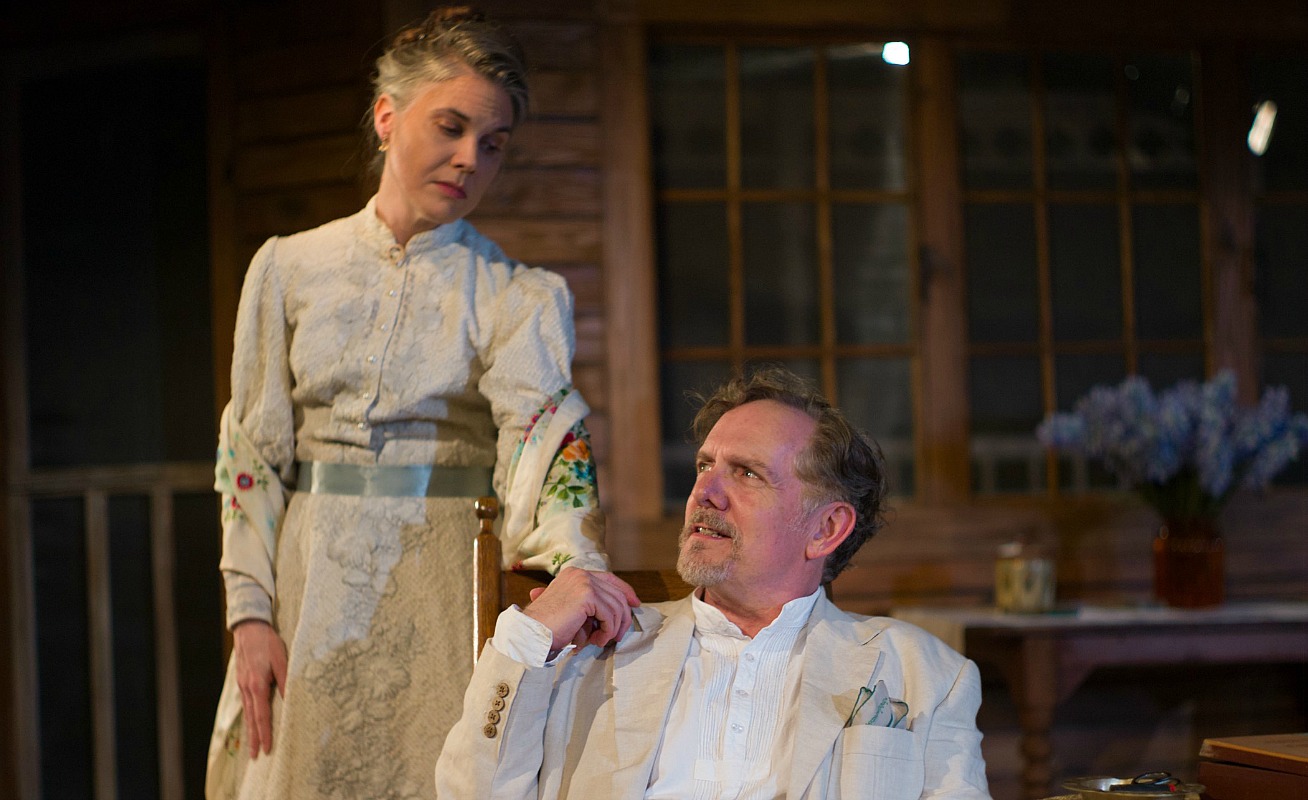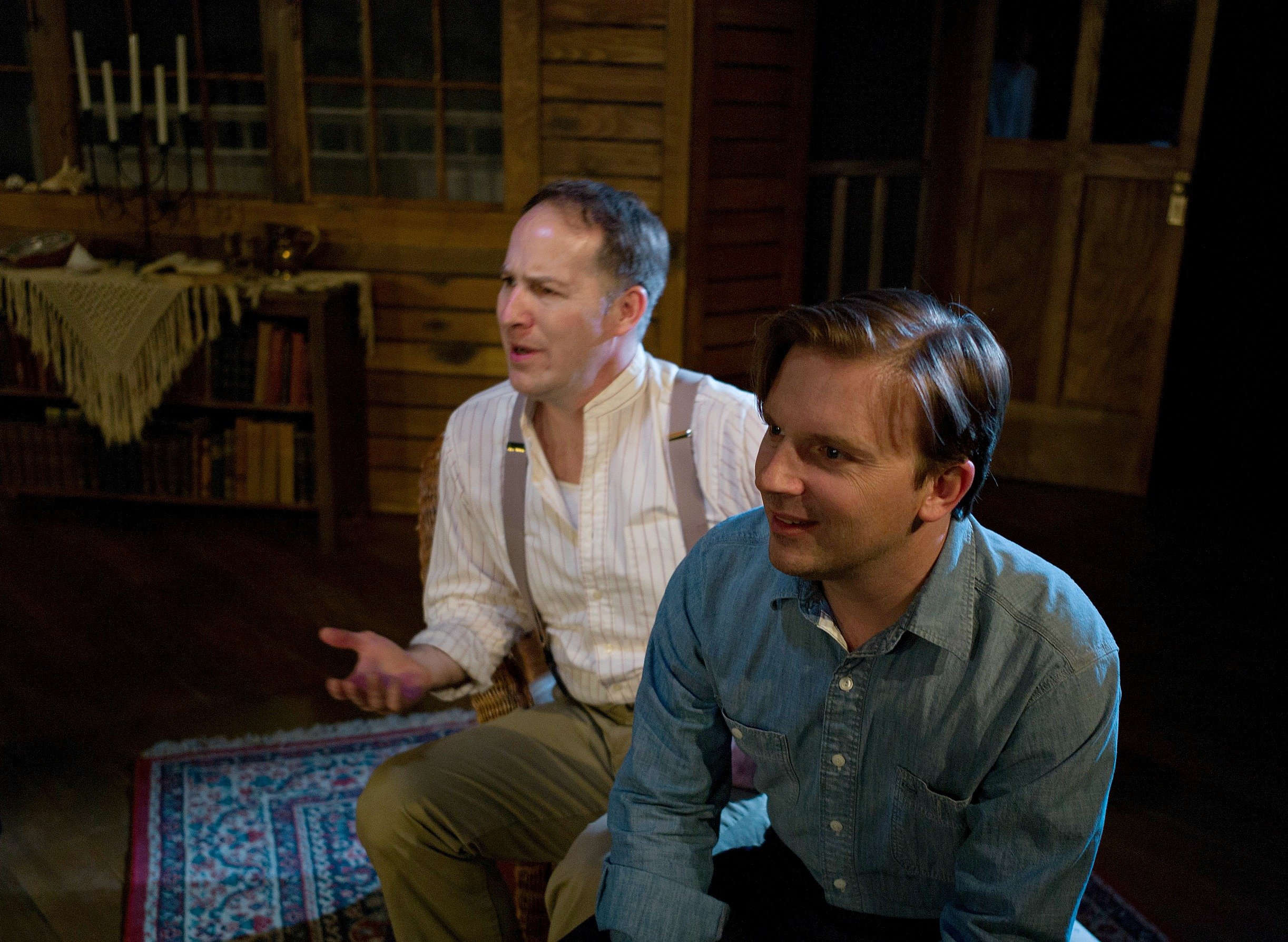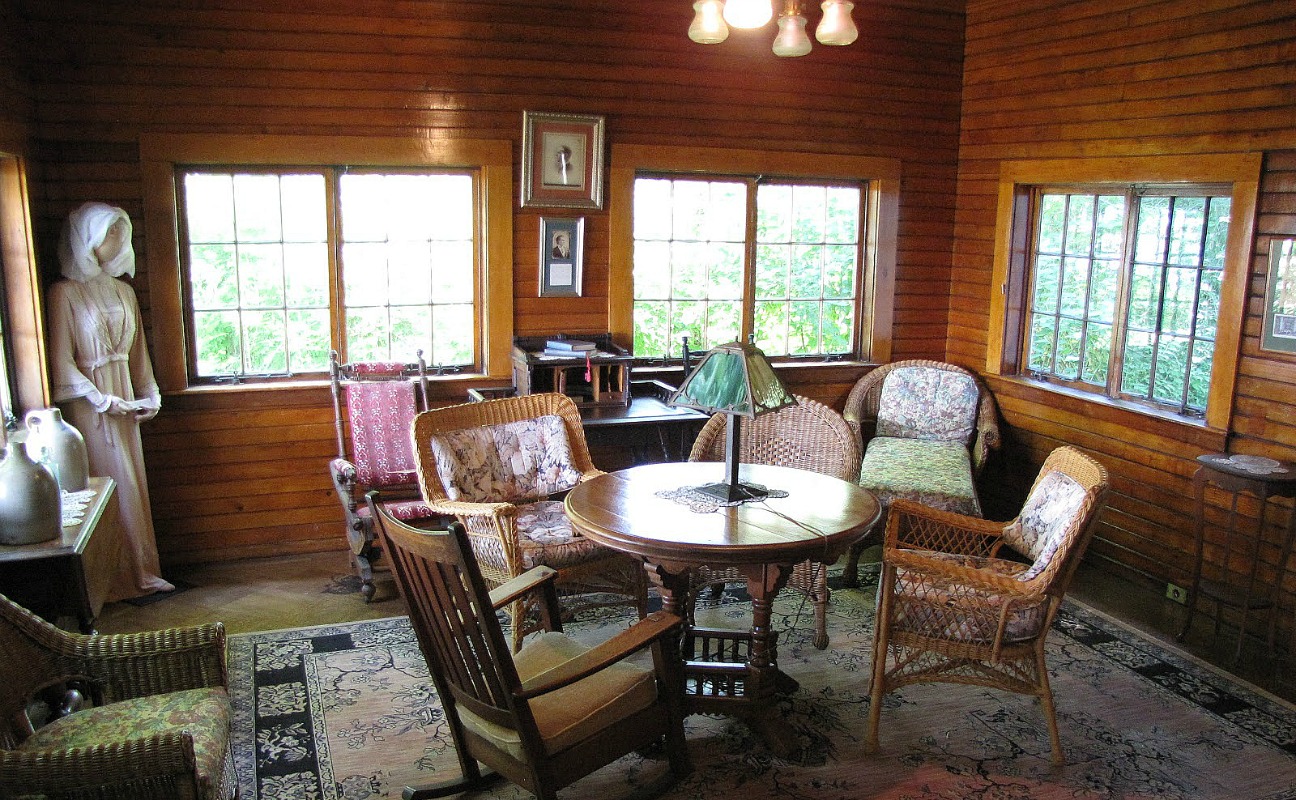Two Savage Comedies Of Theater Life: Kitchen Dog’s ‘I’m Gonna Pray For You’ And Undermain’s ‘Long Day’s Journey’
ArtandSeek.net February 28, 2016 18
Joanna Schellenberg as Mary Tyrone and Bruce DuBose as James Tyrone at the Undermain. Photo: Katherine Owens
There are two plays currently onstage in Dallas – one’s a great American classic, the other’s a recent, caustic, off-Broadway hit. They were written more than 70 years apart, but Art & Seek’s Jerome Weeks talks to Justin Martin about how ‘Long Day’s Journey Into Night’ at the Undermain and ‘I’m Gonna Pray for You So Hard’ at Kitchen Dog are remarkably similar. They’re both merciless, comic dramas about family life in the theater.
JUSTIN: These two theater companies, Undermain and Kitchen Dog, didn’t plan on these plays as a pair. But you say the echoes between them are remarkable. So what are we talking about here?
‘Long Day,’ of course, is Eugene O’Neill’s devastating portrait of his family. O’Neill’s own father James, like the father in the play, was a popular stage star. Bruce DuBose plays James Tyrone in the Undermain production, and he uses his voice as a rich but weary, matinee-idol baritone, particularly when Tyrone unburdens himself late in the play about what would trigger the many sorrows that followed: He cashed in on a piece of theatrical junk, touring for years in ‘The Count of Monte Cristo.’
“I’d lost the great talent I had through easy repetition,’ Tyrone says, “never learning a new part, never really working hard. Thirty-five to forty thousand dollars net profit a season like snapping your fingers!”
James sold his talent because his own childhood of near-starvation left him terrified of poverty. So when his wife Mary had a painful delivery in a New York hotel, James found a cheap doctor to save a few bucks, and Mary got hooked on morphine. When the play begins some 20 years later, Mary is seemingly in good health from a recent stint in rehab. But James and his adult sons watch in anger and horror as she quickly falls back into addiction — again — and they promptly start drinking and bellowing their blame at each other.
That all sounds pretty harsh. And there’s nearly three hours of this?
But I think critic Ethan Mordden put it best. O’Neill spent his life writing and re-writing the same family tragedy, and with ‘Long Day’s Journey,’ he finally got it right. O’Neill wasn’t stupid; over his long career, he’d written multi-part sagas, Greek revivals and neo-Expressionist experiments, but he’d also been a commercial Broadway playwright. He knew full well that nearly three hours like this would wear down most audiences.
So – he sent in the clowns?

Shelby Davenport as Jamie and Josh Blann as Edmund in ‘Long Day’s Journey’ at the Undermain. Photo: Katherine Owens
At what?
Pause — within reason.
By this point in the play, the only hope the Tyrones have is that Edmund might actually be cured. It’s clear, spiritually, no one else will be saved. Yet even at this moment, James has a comic, reflexive spasm of stinginess.
Simply put, O’Neill’s characters cannot help themselves – and that’s the essence of both comedy and tragedy. Director Katherine Owens plays with that point where the one turns into the other — and the results pay off in the last act, O’Neill’s supreme achievement. This is where the unbuttoned, boozy truth-telling of father and sons turns vicious and silly. They try to play cards while nearly blind-drunk, they bicker and yell, even as they frantically shush each other. They’re terrified of waking the opiated ghost that Mary has become — the heart-wrenching embodiment of all their failures as a family.
Frankly, Owens and her cast could have found even more points of humor — as in Jamie’s determined pursuit of drunken oblivion. Humor can amplify O’Neill’s bleak vision by making the Tyrones seem even more trapped, self-loving and self-loathing.
are good reasons the Undermain production has been selling out night after night. The cast, for one thing, is exceptional. Mordden has argued a chief reason ‘Long Day’s Journey’ is considered the Great American Drama is that O’Neill created Big Roles in it. The American theater, at last, added thrilling roles to the ranks of characters such as Cyrano, Prospero and Mother Courage. First among these is Mary Tyrone. Joanna Schellenberg offers a steelier Mary than usual, her hands like claws, twisted in pain and anger. She makes Mary truly driven; both a strong-willed woman and a terrified addict, frightening in her rages and pleas. Schellenberg’s stuttering leaps between the two can be electrifying.
But in her last soliloquy, when the morphine has drifted Mary back to adolescence, Schellenberg doesn’t deliver the dreamy wistfulness the speech needs. Mary is not seeing the world any longer; she’s lost in her memories like an Alzheimer’s victim — the kind of psychological obliteration Jamie can only long for. Instead, Schellenberg speeds through the lines (after nearly three hours, who wouldn’t?).
Yet it’s Mary’s final words that sum up O’Neill’s lifelong, Schopenhauer-like conviction that life’s a fraud. Happiness is just an escape from the horrid reality of existence. That escape may be welcome, oftentimes isolating, but ultimately it’s a flimsy illusion, a ‘pipe dream.’ And even as an escape, it fails us. It’s brief, it’s useless, just a memory of the past that taunts us.
In recent seasons, Bruce DuBose has brought a welcome touch of comic hamminess to such characters as Goldberg, the lead gangster in ‘The Birthday Party.’ They were preparation for his Tyrone, whose self-consciousness is a crutch and a target. Using his own theater family in ‘Long Day’s Journey’ allowed O’Neill to use the notions of disguise and role and phoniness as essentially a substitute for Freudian analysis. Seeing through people’s posturings to what is sordid and real underneath (morphine addiction behind a mother’s love, stinginess powering a father’s morality) are ways these characters torment themselves. The two sons’ disgust and pity for their parents are predicated on their own supposed clear-eyed honesty, their unwillingness to be fooled anymore. But to the old actor’s affectations DuBose also brings if not a pained grandeur than a touching recognition of his own failings, which is perhaps the closest thing O’Neill holds as an unassailable human value.
As the younger son, Edmund, Josh Blann is thoroughly appealing and earnest, but a little robust and rosy-cheeked as a maritime wanderer and TB victim. Even with his nagging cough, we’re not really worried for his future. On the other hand, Shelby Davenport vigorously conveys Jamie’s despair and jeering humor. Some actors manage this only as a smart-ass pose; Davenport’s Jamie’s cynicism is bone-deep. He’s completely convincing when Jamie, in trying to put Edmund ‘wise to the world,’ warns his brother he’ll drag him down, too. There’s actually something bracing in such savage honesty. No wonder Jamie seeks to numb himself.

Monte Cristo Cottage, the O’Neill family home in Connecticut.
When it comes to production design, Owens brought in the Undermain’s A Team. This is a handsome, brooding production — thanks in part to Giva Taylor’s lace finery for Schellenberg and the linen period outfits for the men.
And then there’s John Arnone’s set and Steve Woods’ lighting. Arnone has reproduced the sun-bleached, wicker chairs and the dark, unpainted wood paneling that lines the walls of Monte Cristo Cottage, the O’Neill family home in Connecticut. Much of the set is in gloom because James Tyrone — like Dickens’ Scrooge — knows darkness is cheap. The gloom permits Owens a lovely, wraithlike effect: In the back hall, we see characters silhouetted in the shadows as they walk away, their steps stirring up fog.
[Which brings up one production quibble: son Jamie works up a deep thirst cutting the garden hedge in the first act but there’s not a drop of sweat on his face nor his clothes. Similarly, both Jamie and Edmund walk for hours through the night fog of an ocean-front town, a fog that has Edmund getting out his seaman’s pea jacket. But while Jamie returns slightly mussed from his whorehouse carousing, both men are bone-dry. Walking in a fog is walking through a cold mist. At least their hair would be wet.]

Barry Nash and Jenny Ledel in Kitchen Dog’s ‘I’m Gonna Pray for You So Hard.’
So how does the Kitchen Dog comedy fit here?
I’m not saying Feiffer was directly inspired by O’Neill, only that ‘Pray for You So Hard’ feels like ‘Long Day’s Journey’ trash-compacted to 90 minutes with just a father and a daughter on the Upper West Side. The father is a dissolute but acclaimed, old-school playwright, and he’s laying out the harsh facts of theater life to his adult daughter, who’s debuting in an off-Broadway revival of Chekhov’s ‘The Seagull.’
The theater is plagued by hateful, envious critics, he tells her, plagued by casting directors blind to real talent, by cowardly gays and sexy, non-threatening actresses who succeed over ones who aren’t so complaisant, so conventional-looking. Ultimately, it seems dad may be announcing these familiar indictments as a way of preparing his daughter for some bad news. But it’s also plain that, one, Dad has never forgiven anyone anything, and two, he’s a petty, manipulative bastard.
As in O’Neill’s play, memory is a millstone here, something that can’t be escaped but also something that gets used as a weapon, dragging everyone down. Just like in ‘Long Day,’ people say they’re trying to help while they’re actually sticking the knife in deeper. Dad wants to give his daughter advice, boost her spirits; at the same time, he’s belittling her, mocking her, letting her know full well she’ll never measure up, really. And like ‘Long Day,’ the two characters fuel their talk with joyless, relentless drinking, drug abuse, vicious rants. I can’t quote from them, frankly, because dad’s hilarious but he’s also profane and homophobic and sexist.
And just as in ‘Long Day,’ there are great roles for actors here. Barry Nash has mostly appeared in smaller, character-actor roles. Here, he’s been given the chance to deliver an epic performance, an hour-long symphony of petty revenge, sweeping as the dad, and Jenny Ledel is not far behind as the daughter. Lee Trull has never directed better; the show is tight and
And like ‘Long Day’s Journey,’ ‘Pray for You’ is somewhat autobiographical. Playwright Halley Fieffer is a child of the theater. Her father is the cartoonist and writer Jules Feiffer.
You mean the guy who wrote ‘Carnal Knowledge.’
People get hung up on the autobiographical elements in both plays — partly because we still think of autobiography as somehow validating fiction but also because we see these instances as the playwright taking revenge against the father, turning the tables on him. Yet in terms of the theater, these plays actually offer revenge on the father’s style of drama.
Both plays hold up the old man’s ideas of theater as essentially out of date and even dishonest — and both plays offer something more current instead, something, the playwrights believe, that cuts more deeply. ‘Pray for You’ even switches locations and styles — the setting becomes an off-Broadway theater, where the daughter’s own ‘meta-theatrical’ performance has been staged. And in these supposed acts of revenge, it’s worth noting, both playwrights indict themselves.
Still, the two plays are more than 70 years apart. There’s gotta be something different — other than the acid humor and the whole father-daughter thing. What distinguishes their images of life in the theater?
Fame is never an issue, never really a concern in ‘Long Day’s Journey.’ Not even James Tyrone mentions it as a particular desire of his on the stage– he talks about art and talent and money, never celebrity. What drives and tortures all the Tyrones is an image of the wholesome, loving family they never were. Mary berates James repeatedly, they never had a home, not a real home. They lived in hotels. Even their summer house — each year, they resided there so briefly Mary never could hire decent help.
Mary excuses James, though, and their sons because they never had the benefit of a good upbringing. In other words, they never knew what a family was supposed to be, yet they all torture themselves with that ideal — with what amounts to a fantasy, a possibility that was ruined practically in utero by Edmund’s painful birth.
It’s revealing, then, that no such idea of a loving family is ever mentioned, ever bothered with in “Pray for You So Hard.’ No one cares about family. No one accuses anyone else of being a bad father, mother or daughter, no matter how dreadfully they behave toward each other. Instead, what’s pursued so avidly in “Pray for You So Hard’ is fame, naked, pure and simple. As the father jokes, one of the benefits of fame is getting to live forever. It’s that powerful, that precious. And it’s why he considers his daughter a failure — she’s not sufficiently ruthless, pretty or talented enough to succeed in this business. And it’s clear to both of them that success on stage, in life, is measured by fame. Nothing else matters.
So it’s fairly clear — fame is what these two have instead of love. And in both of these plays, the sins of the father are inherited by the children. But also, clearly, some of the talent was inherited as well.
Justin: Thanks, Jerome









